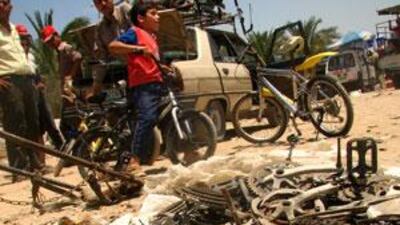GAZA CITY // A splintered showerhead, a single fan blade and a gutted Japanese stereo are among the items 24-year-old Abdul Eswad sells from his stall at Gaza's weekly Fras flea market on a sweltering Friday morning. Becoming unemployed just a few months ago, Mr Eswad recently opened up shop at Fras after the mounds of rubble resulting from Israel's military assault last winter suddenly put him in the business of buying and selling crates full of junk.
"People were selling things from their destroyed homes in the refugee camp where I live so I thought, 'why not?'," Mr Eswad said. "I started buying things for 10 shekels [Dh9.36] and selling them here for 12. It works for me, and the people will buy anything." Suffering under years of economic siege and more recently a punishing Israeli assault, Gaza's previously middle-income economy is now relying on scraps to keep itself afloat.
Ninety-eight per cent of the enclave's 3,900 factories are closed, according to Amr Hamad, the executive manager of Gaza's Palestinian Federation of Industries. A blanket prohibition on the import of raw materials, spare parts and machinery, as part of a two-year Israeli-Egyptian blockade, has sucked the lifeblood of Gaza's once-promising industrial sector. Manufacturing, carpentry, woodwork, mechanics, metallurgy, industrial agriculture and construction have all nearly ground to a halt.
Fragments of short-lived prosperity - whether a shattered plastic pipe, the buttons of a remote control or a tiny coil of copper wire - are salvaged and resurrected wherever and however possible. Some appliances are dissected and sacrificed to revive others. Where they are available, old Israeli parts rejuvenate Gazan appliances. Here, even the recycled is recycled. In the Jabaliya refugee camp's Khorda market, or literally the market of "things of no use", the purr of gasoline-fuelled generators is punctuated by the clank of hammers and tinkering of busy hands.
Despite the death of Gaza's formal industry, here it feels like at least someone - or something - is at work. "Necessity is the mother of invention" seems a fitting motto for this tiny bazaar of scraps. Osama al Henawi crouches with a screwdriver over a display of fractured blenders, irons and fans. Across from him, a boy fastens a new pair of shoes with a withered piece of leather. Faraj Fayad, 33, fiddles with his crippled products outside in the searing Gaza sun.
"I took parts of three old motors that came in before the siege to create an entirely new motor for this washing machine," said Mr Fayad, drenched in sweat. "But it won't last longer than three months, I'll have to find another one." Mr Fayad shows how he moulded the top of an old, Israeli-made stove, complete with Hebrew markings, to fashion a new washing machine door for a local customer. He then manipulated the parts of an AM-FM radio to fit another washing machine's insides.
Most of the parts that come through the smuggling tunnels under Gaza's border with Egypt are either inadequate or too expensive for these poverty-stricken craftsmen. "Whenever I see copper, I buy it. Whenever I see a motor, or something that could be used for a motor, I buy it," said Mr Fayad, who sometimes spends days hunting for workable parts across Gaza. Khaled Halil was once an importer of Israeli-made machinery for Gaza's heavy industries, buying first-rate equipment from the Jewish state and selling it to local factories for their production needs.
Now, he presides over a dusty Gaza warehouse of industrial skeletons, hacked and dismembered for their recoverable parts. Businesses forced under by the blockade re-sell him machines he sold them in the past, sometimes even just the twisted, metallic debris of something damaged in an Israeli air strike. In the three-week offensive of last December and January, 820 commercial enterprises were either partially or completely destroyed by Israeli firepower, Bassam Mortaja, managing director of the Gaza Chamber of Commerce, said.
Gaza's private sector was hit with US$140 million (Dh515m) in direct physical damage as a result of the war, according to an assessment carried out by the United Nations Development Programme and the Private Sector Coordinating Council in Gaza, a consortium of private institutions in Gaza and the West Bank. But nothing is without value in a place that some analysts say is experiencing a period of economic "de-development".
"We continue to buy scraps of metal and machinery from wherever we can, whatever we can refurbish," said Mohammed al Mansi, vice chairman of Gaza's metal industries union. "We will take a metal tube that has been damaged and create a smaller one out of it, as if it is new. This is all we can do until the borders open again." Because of frequent Israeli strikes on Gaza's metal workshops, which Israel claims provide militants with key material for weapons manufacturing, Mr al Mansi said his sector has been one of the hardest hit.
"The materials my workers use now, before they would be considered absolute rubbish," he said. "But now, these scraps, to us, it is as if they are gold." ecunningham@thenational.ae

